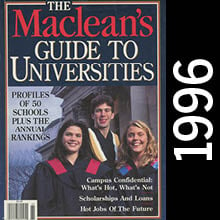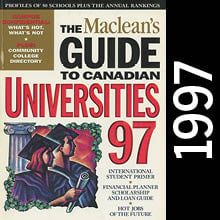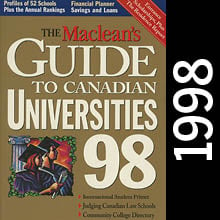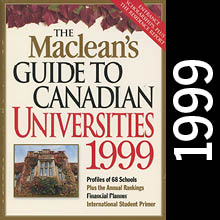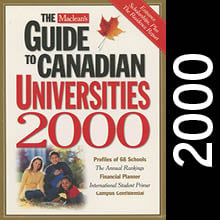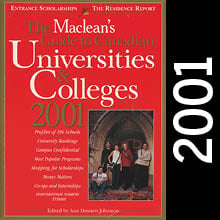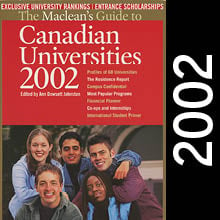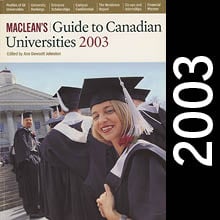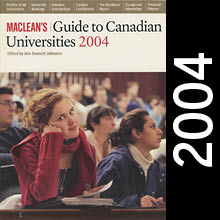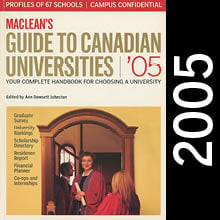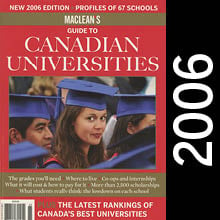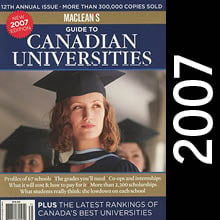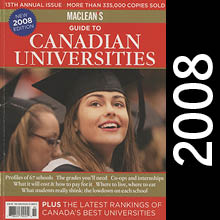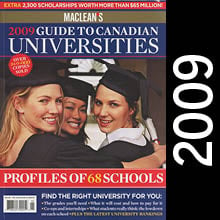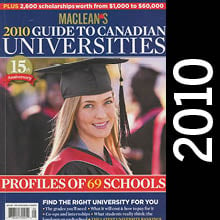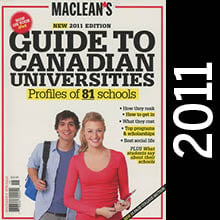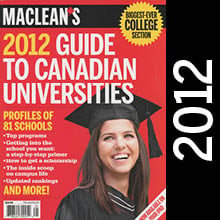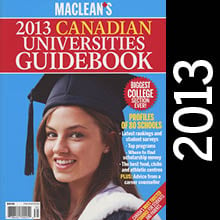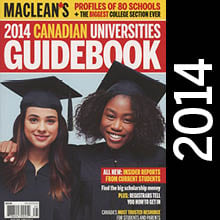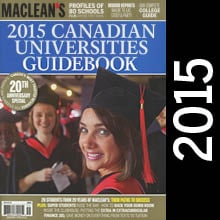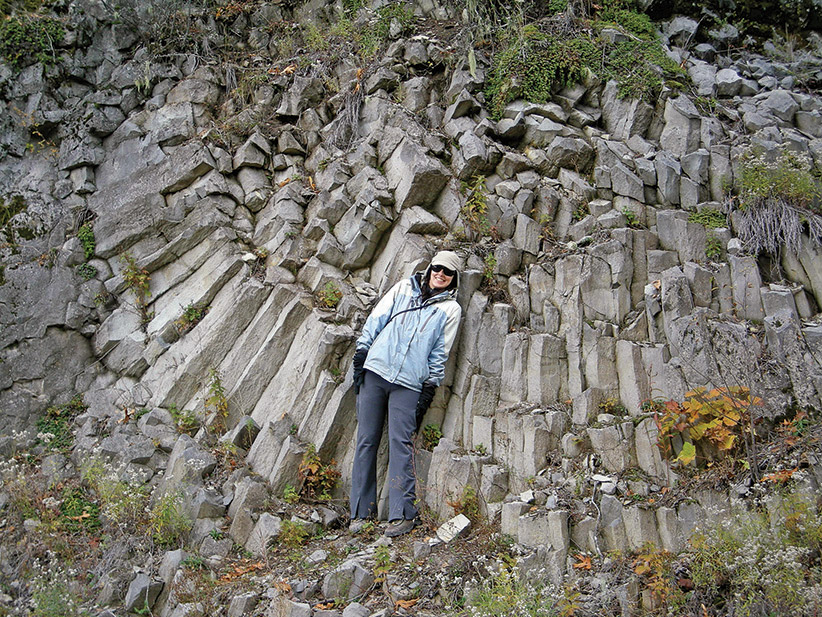Look at them now: 20 years of the Maclean’s University Guide
To celebrate the 20th birthday of our University Guide, we tracked down two decades’ worth of grads we interviewed in those pages to see where they are now
Share
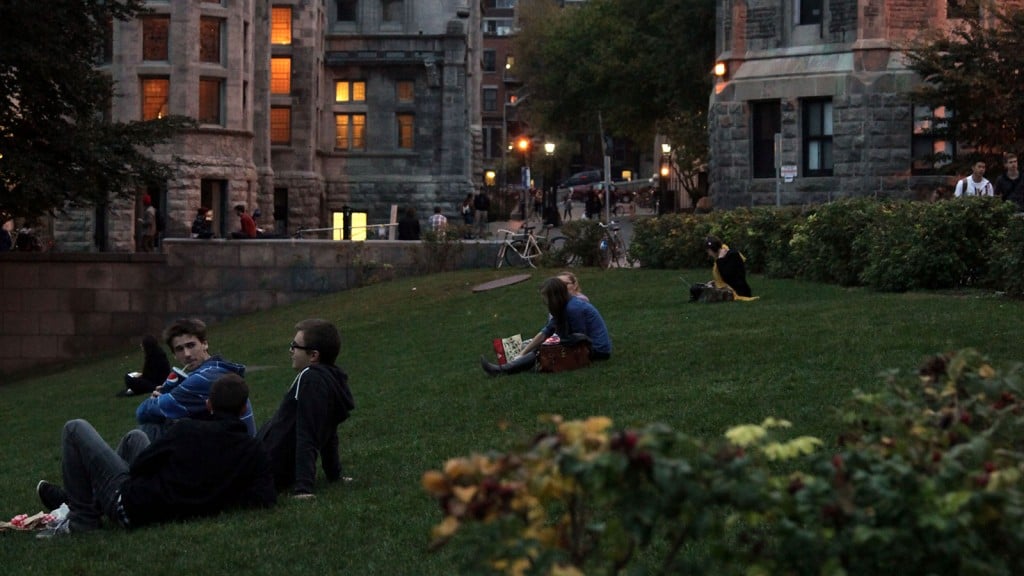
It was 1996, Jean Chrétien was prime minister, it was cheaper to rent an apartment in Vancouver than live in residence and, at Brock University, both sexes were dying their hair blond. A year at university would set you back about $10,000. Every year since then, Maclean’s Canadian Universities Guidebook has been an invaluable resource for parents and students in their quest for higher education. This year, we tracked down a student featured in each edition for the past 20 years to provide a snapshot of what a university education can do for you. To view each graduate’s profile, tap the photo of University Guide cover of the associated year below.
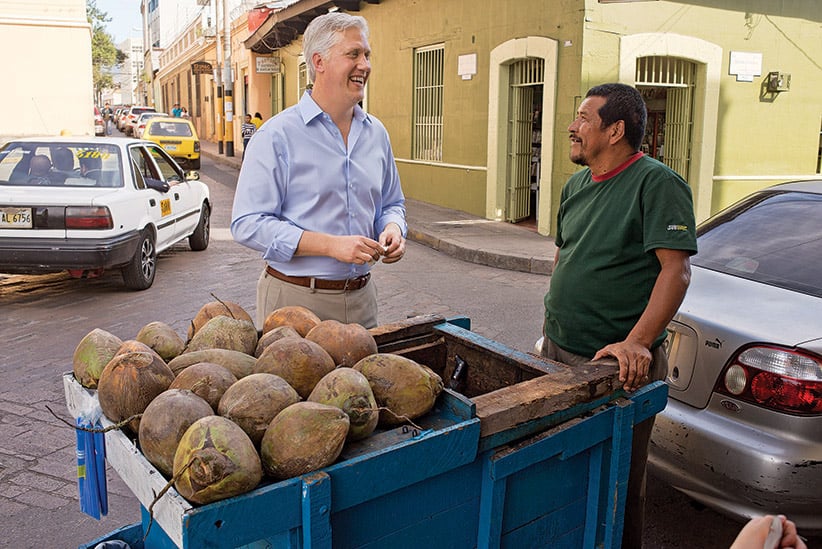
1996
Chris Mueller
After Chris Mueller graduated in 1995 from Carleton University with a bachelor of commerce in international business, his goal was simple. “My plan was to become independently wealthy and travel around the world,” he says. The son of a military fighter pilot, he was used to moving around a lot, from West Germany to Holland to Alberta. He wanted to recreate a life similar to what he had growing up—skiing in the Swiss Alps, sightseeing in France—but not as a tourist on vacation. He wanted to live in other countries.
In our inaugural Maclean’s Guide to Universities, published in 1996, we learned that Mueller quickly found work out of school as a financial planner for the London Life insurance company. Since then, his career has taken him from central Asia to Latin America.
Two years after starting with London Life, Mueller was hired by Canadian Bank Note to become a sales service manager in Ottawa. At 26, when the company got the licence to set up a national lottery in Kyrgyzstan, Mueller was sent over as general manager. It didn’t matter that he didn’t speak Russian. The opportunity was too good to pass up and he was willing to relocate.
Life was fun in a country that had been granted independence after the collapse of the Soviet Union, even if parking was sometimes a pain and the occasional elevator was out of order. On his 27th birthday, Mueller split the cost of a helicopter rental with his friends to do some heli-skiing in the mountains. “It’s, like, 96 per cent mountains [in Kyrgyzstan]. It’s the Switzerland of central Asia,” Mueller remembers. “It’s just so beautiful.”
Work was good, too, but his company’s scratch lottery had trouble competing with a government-tolerated, mob-run competitor, he says. Rather than go up against the mafia, his company opted to close down there.
Around the same time, Canadian Bank Note won the chance to set up an electronic lottery in Honduras, so Mueller was asked to transfer to Latin America. The move raised some eyebrows among his Kyrgstani friends. “There was an expression in the Soviet Union,” Mueller remembers being told. “ ‘No matter how bad it is here, it’s worse in Honduras.’ ”
But Mueller, now 42, doesn’t think Honduras is all that bad. After all, he’s been living there for the past 13 years. As work with the lottery wound down, he found new positions with local companies, including helping to set up a pharmacy chain—think Shoppers Drug Mart for Hondurans.
By 2007, he was ready to move with his wife and two children to Canada. One-way plane tickets were purchased and their furniture was mostly sold. But, before he could get on that flight, Grupo Mandofer hired him as general manager for its multimedia division. Two years later, while earning his master’s degree, he became general manager of Grupo Mandofer’s pharmaceutical arm. Now he’s CEO of the whole company.
Soundtrack: Glass Tiger and Bryan Adams
Bookshelf: The Alchemist by Paulo Coelho
Advice to younger self: ‘Don’t plan as much’
Fashion file: ‘My father went to Carleton and graduated 25 years before my first year there. I borrowed his Carleton graduation ring and promptly lost it. That’s one thing I really wish I had.’
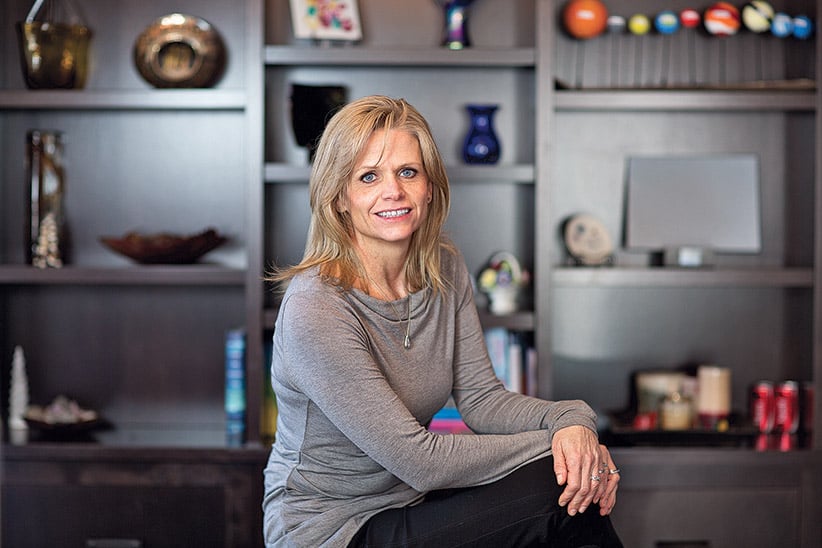
1997
Deniene Kristensen
Fresh from the University of Calgary with a bachelor of commerce and a major in human resources management, Deniene Kristensen wanted to be an HR professional. “I could never see myself as an accountant, because I like people too much,” she told Maclean’s. She found work in her field, getting hired straight away by Koch Oil Co. as a human resources adviser.
The company was going through a growth spurt, and Kristensen, now 48, hired plenty of new faces “to go into what we call the marketing side of oil and gas,” she explains, “which is a little different than traditional marketing.” But it wasn’t long before she joined the team that was purchasing and marketing crude oil. “That was about a year after that [Maclean’s] article,” she says, “and I’ve never gone back.”
Along the way, she got married and had two kids, while her career evolved from buying barrels to running the shipping side of the business. She’s worked with refiners, small pipeline companies and big pipeline companies. In 2007, she was hired as a marketer with Crescent Point Energy, another oil and gas company, where she is a manager.
Not only does she help handle the logistics of getting oil to market—be it by pipeline, rail or truck—her job also includes work with both sales and, yes, accounting. It might sound quite different to HR, but she stresses there’s plenty of overlap. “It’s still all about people, building relationships and problem-solving,” she says. “Basically, my whole degree prepared me for this.”
When she hires people now, she often asks: “What does a perfect day look like for you? When you go home at the end of the day and say, ‘Yes, I nailed it,’ what were you doing?” So how would she answer that question?
Kristensen tells a story about growing up on a farm at Plain Lake, just south of Two Hills, Alta., where she and her sister had to feed the livestock—dairy cows, pigs, horses, chickens, turkeys and geese—during the winter, while their father was away in Fort McMurray. The granaries were atop a hill and, one day, they had trouble getting the tractor started. So they grabbed a toboggan and some five-gallon pails to transport the feed. “We had a blast doing it, and that actually became our preferred way to move stuff, because it was less hassle than getting the equipment going,” she remembers. “Those are the kinds of solutions I have to find every day at work.”
Playlist: You Spin Me Round—Dead or Alive
Advice to students: ‘Even though it might not seem relevant to your life, pay attention, because it might come in handy later,’ she says, remembering a management course at U of C. ‘I draw upon a lot of the lessons from that class.’
Facebook footnote: At the graffiti pub crawl, Kristensen and friends wore white coveralls, upon which others wrote goofy stuff in crayon
Model student: Kristensen hates her Maclean’s photo. ‘I said to my daughter that the only way I’ll do this [interview] is if they promise not to run the old photo.’
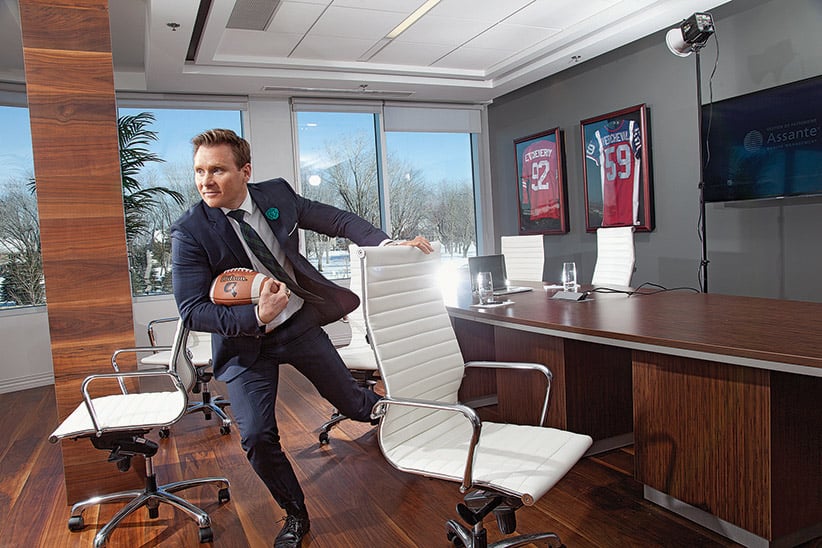
1998
Éric Lapointe
When Éric Lapointe last talked to Maclean’s, he was a third-year French literature student and star football player at Mount Allison University, where he talked about its laid-back feel and the fact that he could converse in French, but also improve his English in his quest to become bilingual.
He figured he would play a fifth and final year and that would be the end of his football career. The Montreal-born running back was only 29 yards short of the Canadian Interuniversity Sport all-time rushing record and, though drafted by the Edmonton Eskimos in 1999, was cut from the team during his first CFL training camp. After two days back on campus in Sackville, N.B., he got a call from the Hamilton Tiger-Cats. One of their players was injured, and they wanted Lapointe to fill in. He decided to give his pro career one last chance.
In his CFL debut, Lapointe ran for 187 yards and scored a touchdown against the Winnipeg Blue Bombers. Needless to say, the Ticats kept him on the roster, and the team went on to win the 1999 Grey Cup. “I owe my eight-year career to that one game,” he says.
Even while he was putting on his gear each day, Lapointe knew he had to prepare for life after football. “I was nervous what would happen if I got hurt,” he says. “I wanted to work in finance.” While a member of the Ticats and later with the Toronto Argonauts, Lapointe started the Canadian Securities Course, as well as the Canadian Investment Funds Course.
After a poor season in Toronto, Lapointe thought his football career was finished, so he decided to start a business in Montreal. Then the Alouettes called, and he ended up playing football for another six seasons. That’s not to say he took time off from his wealth-management company. Lapointe would be in the locker room at 5 a.m. for practice, then at 12:30 p.m. he would head to the office.
“The more clients I had, the tougher it was,” he says. “You can’t really tell your clients that you can’t return their calls because you’re in Saskatchewan for a football game.” In 2006, he hung up his cleats for good. “I like finance even more than football,” he says. “It was an easy transition. I went from one passion to another.”
In 2008, he joined Assante Wealth Management in Montreal, where he still works today. Football hasn’t forgotten him, though. In 2012, Lapointe was inducted into the Canadian Football Hall of Fame. Now 40, he can still occasionally be spotted in the stands at Mount Allison football games.
Locker-room playlist: Metallica and Guns N’ Roses
Fashion file: A ripped piece of T-shirt they called the tail. ‘I would give one to every single lineman before the game. As soon as they went down in a three-point stance, their tail would touch the ground. Defenders could grab it and pull it out, but it wouldn’t do anything. I would just get another from the sidelines.’
It’s your future. Make an investment up front with the 20th anniversary edition of the Maclean’s Canadian Universities Guidebook. Now available on newsstands and through macleans.ca/guide for $19.95. Subscribers get the digital edition for free on the Maclean’s app.
1999
Rachel Geddy
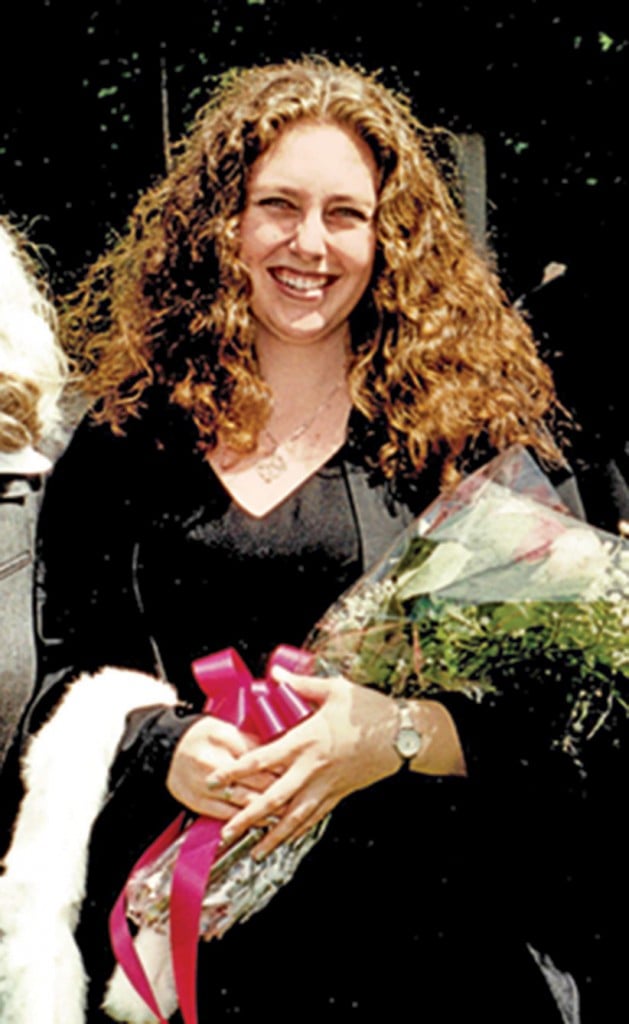 Rachel Geddy remembers the article in the Maclean’s guide. How could she not? She married one of the guys in the photo with her.
Rachel Geddy remembers the article in the Maclean’s guide. How could she not? She married one of the guys in the photo with her.
Back then, finishing her fourth year at the University of Toronto in molecular genetics, classes were small. “People like to think of U of T as a behemoth with classes of 500 or 1,000 students,” she says. “There were only about 22 students in our program.”
After graduating, she did her Ph.D. at McGill University. In the middle of her thesis, her husband landed a job in Singapore, so Geddy ended up working as a molecular biologist for the government there for almost two years.
When she came back to Canada, the Canadian Food Inspection Agency hired her, and it was through her work there that she had plenty of contact with those in Foreign Affairs—so much contact, they decided to hire her. Instead of working on biosafety protocol—guidelines for trading and handling genetically modified organisms when they cross international borders—from a food perspective, she was working on it from a foreign-affairs perspective.
“It was thrilling, because I knew from early in my Ph.D. that, somehow, the science-y lab work wasn’t sitting right for me,” says Geddy, now 38. “It turns out I’m just a big policy wonk.”
Her husband landed a job in Buenos Aires in 2013, and they moved to Argentina, where Geddy worked remotely for 16 months. Now she’s back in Ottawa and expecting her second child. “Looking back on that picture in the university edition,” she says, “who would have known that I would end up doing what I do now?”
Best advice from a prof: ‘Don’t be afraid of hard work’
Undergrad playlist: Song 2—Blur
Fashion file: ‘I went through a bit of a goth phase back then. It wasn’t heavy goth—black jeans and a black T-shirt. Not super-committed.’
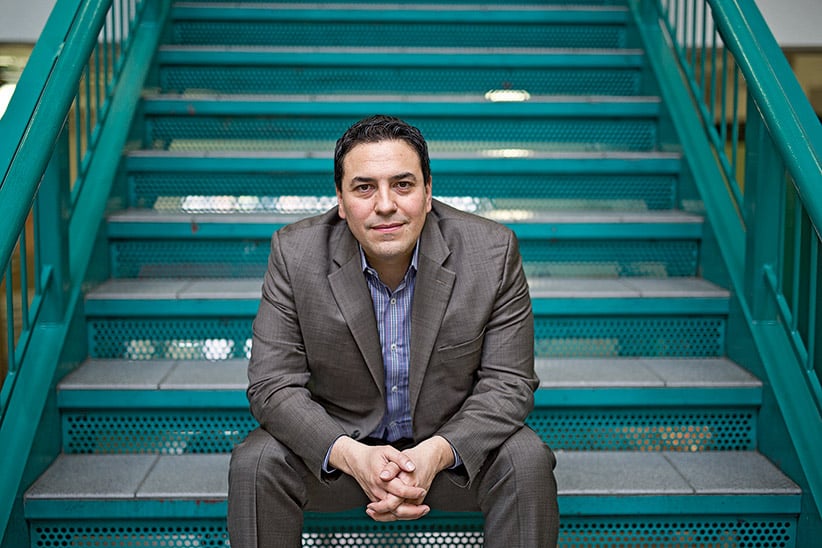
2000
Tulio Conejeros
Fifteen years ago, while studying at the University of Alberta, Tulio Conejeros told Maclean’s: “Co-op changes everything.” He was right.
After multiple co-op terms with the Canadian Mortgage and Housing Corp. (CMHC). in Edmonton, Conejeros was hired full-time, even though he hadn’t finished his commerce degree. That’s not to say Conejeros dropped out to take the job. He did both at the same time.
“All I remember was doing my homework in hotel rooms,” he says. “I used to travel six months of the year.” He would meet with important clients in Mexico, then head to his room to finish assignments. Sure, he missed a few classes, but he finished his degree. And his work allowed him to see the world.
“Because I spoke Spanish, I thought I’d be working in Latin America,” he says. “What ended up happening is I spent a lot of time working in Asia. I spent six years flying back and forth to China without even knowing the language.”
After 13 years with CMHC, his international department was shut down in 2012, and Conejeros was laid off. Within a few months, he found work with Calgary-based Rainmaker Global Business Development as its vice-president for strategic development services and Latin America. Now 40, he describes it as similar work to his previous job, but with a greater focus on oil and gas. Also, he spends fewer nights catching up on homework.
Playlist: Mr. Jones—Counting Crows
Milestones: House at 30. Married at 35. Two kids at 38 and 40.
Fashion file: Really bad leather jacket
Glad Facebook wasn’t around for: After his last exams, out for just a couple of drinks, he ended up being carried home from the bar
On the move: ‘Travelling is such a big component of finding out who you are and where you fit’
2001
Taylor Adams
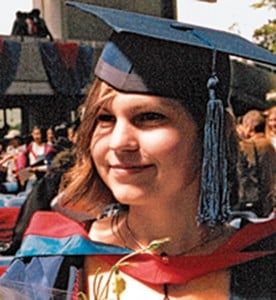 Taylor Adams was just starting Simon Fraser University when she first talked to Maclean’s and wanted to become a psychologist to help young women with challenges surrounding body image. Later this year, the 32-year-old hopes to defend her Ph.D. at the Technical University of Dortmund in Germany. “I’ve been in university for 14 years,” she says. “The light at the end of the tunnel is suddenly very bright.”
Taylor Adams was just starting Simon Fraser University when she first talked to Maclean’s and wanted to become a psychologist to help young women with challenges surrounding body image. Later this year, the 32-year-old hopes to defend her Ph.D. at the Technical University of Dortmund in Germany. “I’ve been in university for 14 years,” she says. “The light at the end of the tunnel is suddenly very bright.”
While her academic career has largely stayed on track with her undergrad interests, that’s not to say her life since the turn of the century has only consisted only of books.
During her third year at SFU, Adams went to Uppsala, Sweden, on exchange. She loved it so much, she ended up staying for a second semester. “The most significant part of that trip was I met my now-husband, who was also an exchange student,” Adams says. While in Europe, the two travelled back and forth between Germany and Sweden to see each other. But when it came time for her final semester of undergrad, she returned to B.C. with a new mindset.
“I took back a lot of things I had learned in Sweden about work-life balance,” she says. That means more time for herself and fewer nights studying until 2 a.m. Her reward was the best semester of her life, from both personal and academic standpoints.
After graduation, she was accepted for an internship through Crossroads International to work with the Simukai Street Youth Program in Zimbabwe. She briefly came back to Canada in early 2005, before moving to Ludwigsburg, Germany, to be with her future husband. She taught English her first year, while she learned German.
In 2006, she enrolled at a university in Magdeburg, where she completed a thesis on body image and nakedness. “That came out of my experience in Sweden and Germany, in this sauna culture where people have much less problem being naked in general,” she says. Her research included going back to her home province of Newfoundland for interviews.
After graduation, Adams jumped right into her doctorate at Dortmund in 2009. She also started working at a family therapy program for three years, until she was ready to start a family of her own.
Adams has a two-year-old girl and a boy, born in September. Life with children has meant working part-time on the Ph.D. and taking care of the family part-time. When school is finally over, she hopes to open her own practice in Germany.
Required reading: Reviving Ophelia by Mary Pipher, about societal pressures on adolescent girls
SFU memorabilia: ‘I have some clothing that, every year when we do a spring clean, my husband and I have the same conversation: “Do we really want to keep them?” And I say yes.’
On Zimbabwe: ‘You go wanting to change something and you realize the person who changed the most was yourself’
It’s your future. Make an investment up front with the 20th anniversary edition of the Maclean’s Canadian Universities Guidebook. Now available on newsstands and through macleans.ca/guide for $19.95. Subscribers get the digital edition for free on the Maclean’s app.
2002
Chris Jackman
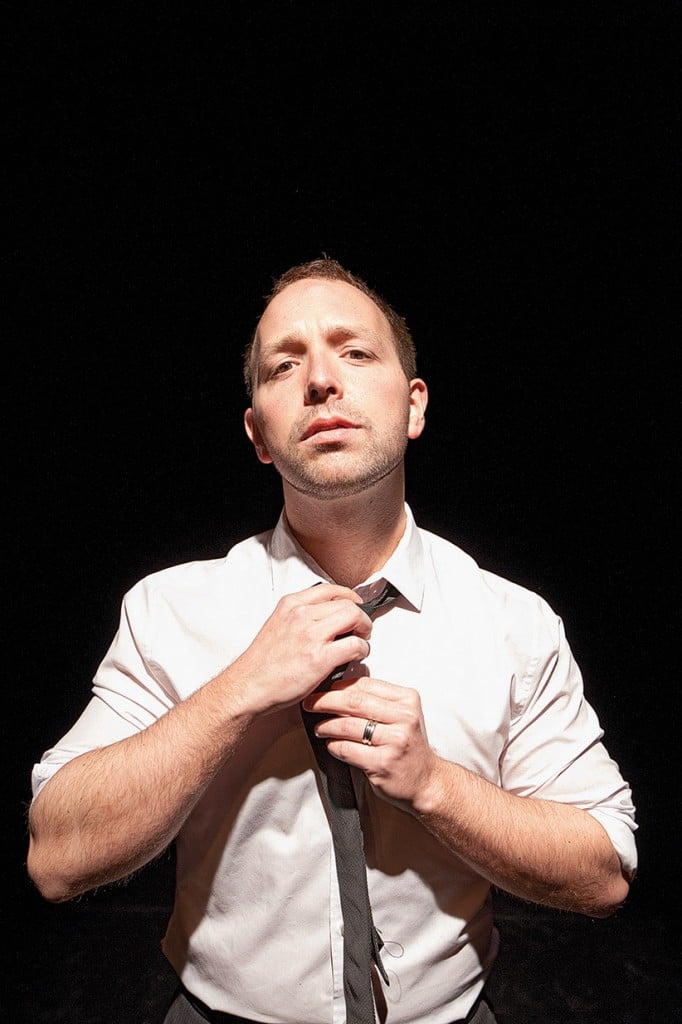 Chris Jackman would do almost anything for a theatre performance. He even dyed his hair red because a script called for it. Drama was his passion, but back in the early 2000s, he didn’t think of it as his future career.
Chris Jackman would do almost anything for a theatre performance. He even dyed his hair red because a script called for it. Drama was his passion, but back in the early 2000s, he didn’t think of it as his future career.
When Maclean’s spoke with Jackman in 2002, he recounted the story of how he found out he won a $26,000 scholarship to Queen’s: His mom ran into the middle of a rehearsal for his high school play with the letter in her hand. “Rereading the article, it said I was interested in medicine, but the thing was, I spent all of my electives and free time doing theatre at Queen’s.” Gradually, he switched from biology to become a theatre major and graduated in 2005. He could have taken a breather from school, but whenever it came time to decide what to do next, there was always more to learn. That’s why he did his master’s in theatre at the University of Toronto and stayed on to finish a doctorate in theatre and performance studies. “My thesis was taking me back to the sciences a bit,” he says. “I was looking at cognition, perception and creativity in physical theatres.” Jackman got his Ph.D. in 2013.
Long after the days of high school drama class, Jackman, now 31, teaches at Brock University, is a private audition coach and runs a kids’ summer musical theatre group—Locke and Keynote Productions—alongside his wife, a Queen’s music alum. (Photograph by Jessica Darmanin)
Playlist then: The Middle—Jimmy Eat World
Soundtrack now: ‘Whenever there’s a wedding, we always break out The Oil Thigh [Queen’s University’s official song].’
Fashion file: ‘I was pretty fond of T-shirts. I’ve come around and I like buttons now.’
2003
Kyrke Gaudreau
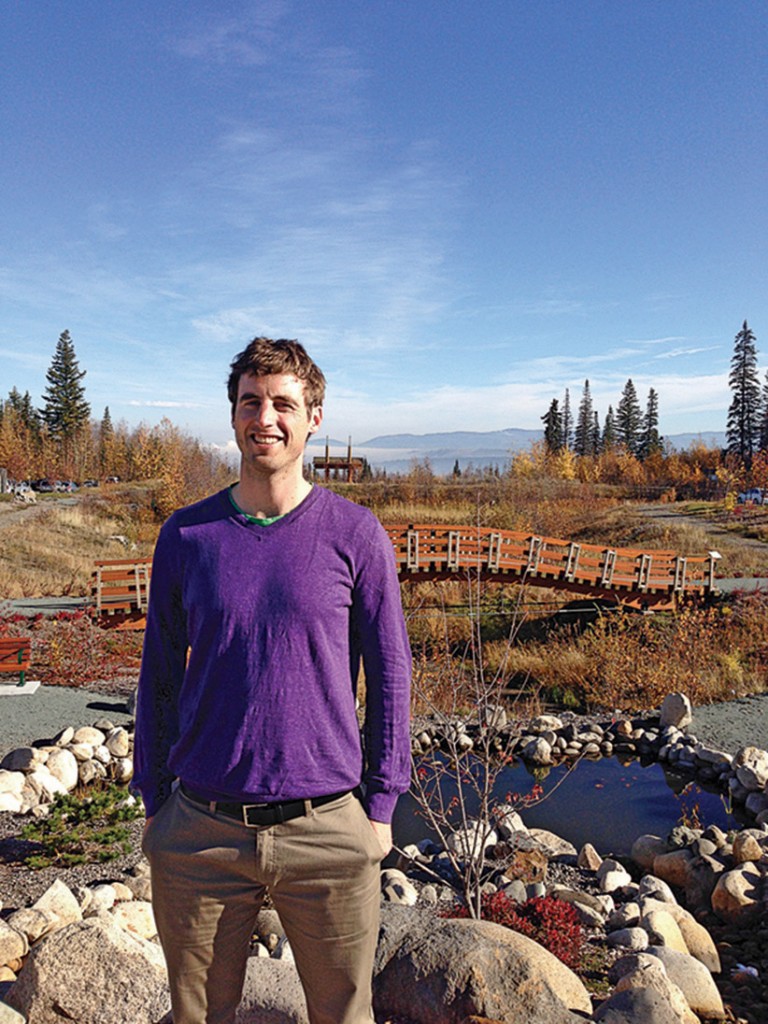 When Kyrke Gaudreau was studying at UBC, he had no clue what he wanted to do. One week, it was biophysics research. Another week, it was civil engineering. He thought about archaeology, then anthropology. “That meandering kept up for quite a few years,” he says.
When Kyrke Gaudreau was studying at UBC, he had no clue what he wanted to do. One week, it was biophysics research. Another week, it was civil engineering. He thought about archaeology, then anthropology. “That meandering kept up for quite a few years,” he says.
Although he loved Vancouver and the university, Gaudreau dropped out after first year when tuition and living costs got too expensive and his scholarship couldn’t cover it. He went home to Montreal and enrolled in mechanical engineering at McGill.
In the end, Gaudreau finished his undergrad in civil and environmental engineering. He was heavily involved in sports and ran a small ice-cream shop, “which is no small feat, because I am horribly lactose intolerant,” he laughs. “My undergrad was a five-year journey.”
The best journey of all was a field trip to Barbados in 2006, where he helped build a small-scale biodiesel plant. He enjoyed it so much that, after getting a scholarship to do his master’s at the University of Waterloo, Gaudreau received funding to expand the plant.
Gaudreau finished his Ph.D. in social and ecological sustainability at Waterloo, where his research focused on energy systems. He got his first job in October 2013 as a sustainability manager at the University of Northern British Columbia. “My hope is that when students leave our doors for the last time, they realize they are citizens of the city, of the province, of the country, of the world,” he says. “There are both rights and responsibilities attached to that.” Now 32, he has settled into working life, though his mind still wanders. “Sometimes I wish I had gone into agriculture. Producing food is one of the most important things we can do in society.”
Undergrad playlist: From his sister’s collection, Time After Time and Total Eclipse of the H+eart. ‘Most of my friends found it quite distasteful and odd, but I love that music.’
Lost, never found: Neon-green headband from Value Village he’d wear biking in the winter. ‘It was heartbreaking.’
Facebook footnote: ‘I joined Facebook when you still got a number. But I dropped Facebook four years ago and I’ll never look back.’
It’s your future. Make an investment up front with the 20th anniversary edition of the Maclean’s Canadian Universities Guidebook. Now available on newsstands and through macleans.ca/guide for $19.95. Subscribers get the digital edition for free on the Maclean’s app.
2004
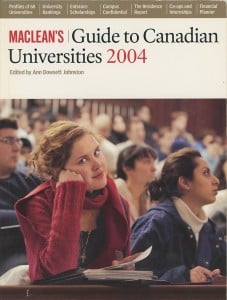
Elizabeth Simmie Combeer
Elizabeth Simmie Combeer doesn’t have the dreadlocks anymore; those days are long gone. Her days in the swimming pool, however, are far from over. Combeer was a nationally competitive synchronized swimmer growing up, and is now a Level 3 coach in the sport.
After graduating from McGill University with an economics degree in 2005, she dabbled in oenology and viticulture—“wine school,” as Combeer calls it—at Brock University, but, after a few months, the Toronto native realized being a winemaker wasn’t for her. “I’m not a botanist,” she says. “I’m very good at wine appreciation and wine history, but not plant-growing.”
Combeer found work in market research before switching to finance. She now works in Toronto for an asset management firm, Bristol Gate Capital Partners, as a senior portfolio analyst. She’s also trying to finish her chartered financial analyst program, something the 32-year-old would have done earlier, but life got a little busy. “I guess I got married and had three kids at some point,” she laughs.
Milestones: Married in 2008; three kids, aged 3, 1½, and newborn
Advice: ‘Almost every professional job out there is client-relationship management’
Fashion file: ‘Every single girl was wearing Uggs, Lululemon and bomber jackets’
Playlist: Led Zeppelin
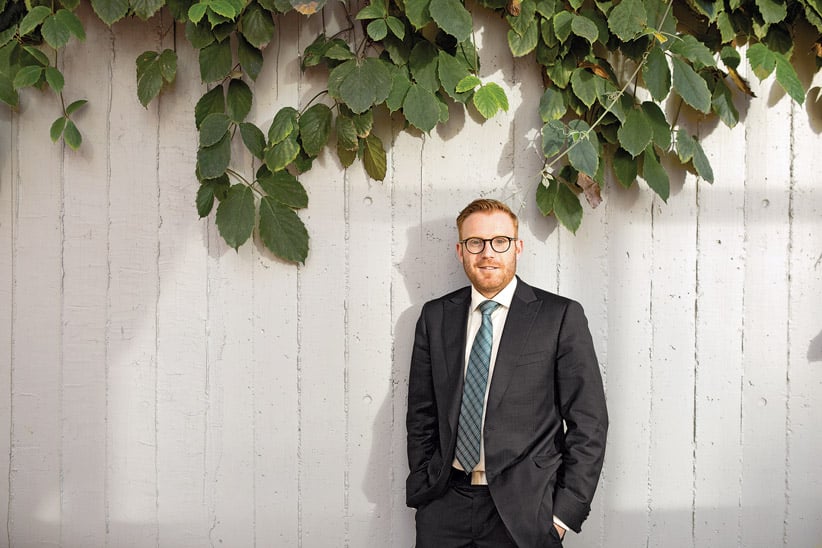
2005
David McGillivray
When David McGillivray was finishing up his fourth year of an honours degree in political science at Acadia 10 years ago, he told Maclean’s about the university’s great school spirit and how everyone hung out with everyone, rather than the typical high school cliques. The Calgary native enjoyed his time out east, and volunteered at the university pool with local disabled kids, but Alberta was home.
After graduation, McGillivray quickly found work with the government of Alberta as a policy analyst working on improving public confidence in the justice system. After a few months on the job, he realized government work wasn’t his passion. He took six months off to travel through Europe and came home to decide between two options: Follow up with a master’s degree in political science or pursue a degree in law. “At the time, I was torn between what to do,” he says.
He decided to stay close to home and started a law degree at the University of Alberta in 2006, which couldn’t have been better timed. The market was hot and firms across the province were looking for fresh recruits. “They were grabbing students really early in the process,” McGillivray says. After a month of classes in first year, he was already interviewing for summer positions and agreed to join Fraser Milner Casgrain LLP. “They subsequently offered me an articling position in my second year,” McGillivray says.
After almost three years as an associate with the firm, McGillivray wanted to focus on regulatory law work. In 2012, he moved over to Bennett Jones LLP to become an associate, where his work is now a hybrid of the energy and oil and gas businesses, and where the 31-year-old remains today. Ten years ago, one might have thought he’d find a career in politics. But the law won.
Milestones: ‘I’m negotiating a dog and we’ll go from there’
Fashion file: ‘I used to have these great sweatpants that said, “Kiss My Axe.” I spent many an hour in those pants.’
Playlist: Such Great Heights—Postal Service
It’s your future. Make an investment up front with the 20th anniversary edition of the Maclean’s Canadian Universities Guidebook. Now available on newsstands and through macleans.ca/guide for $19.95. Subscribers get the digital edition for free on the Maclean’s app.
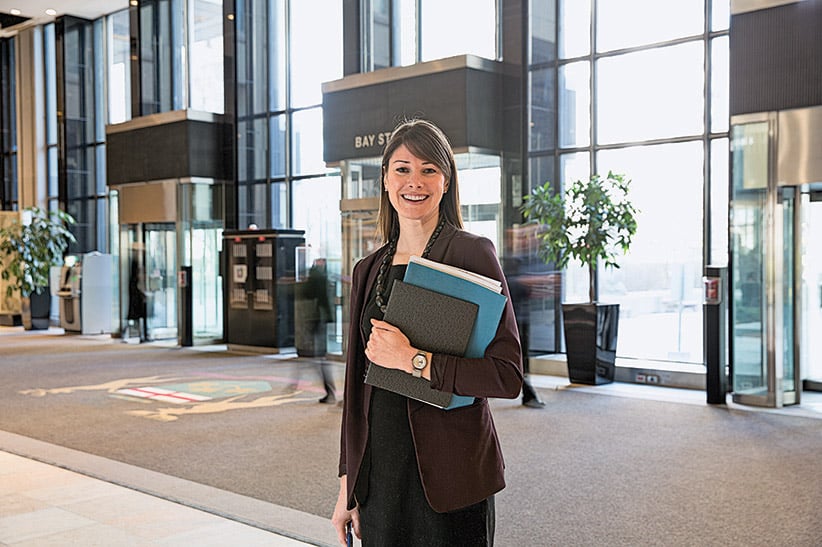
2006
Leigh Eagles
If you told Leigh Eagles a decade ago that she’d be working for the government, she wouldn’t have believed you. With her passion for education—having volunteered at a Nepalese orphanage and spent a summer running a literacy camp in Nunavut—she thought the non-profit sector was where she’d find her career. But after graduating in 2007 with a degree in sociology and development studies at Queen’s, Eagles took a year off to hike in New Zealand.
Not long after her return, Eagles was on her way to South Africa through a Canadian International Development Agency-funded internship, where she gave workshops on gender equality to rural co-operatives.
That experience helped Eagles discover her life’s work in adult education, though not as a teacher. Instead, she started a master’s degree in adult education and community development in 2009 at the Ontario Institute for Studies in Education at the University of Toronto. That led to a job as national coordinator at the Canadian Global Campaign for Education, then at the MasterCard Foundation as part of their youth learning team. That led to a new job with Save the Children Canada. “It’s been job to job,” she says of her career.
The Ontario government came calling in 2014, and the 31-year-old currently works on contract as a senior policy adviser at the ministry of training, colleges and universities.
“Ten years ago, when I was interviewed [by Maclean’s], I was working on the right to education, and I’m still doing that now,” Eagles says. “So I guess I sort of stayed on track.”
Playlist: Lodestar—Sarah Harmer
Fashion file: ‘I used to show up in class in my Birkenstocks or running gear. It’s kind of weird for me to have to dress up in the black tuxedo to go to work.’
2007
Matt Soprovich
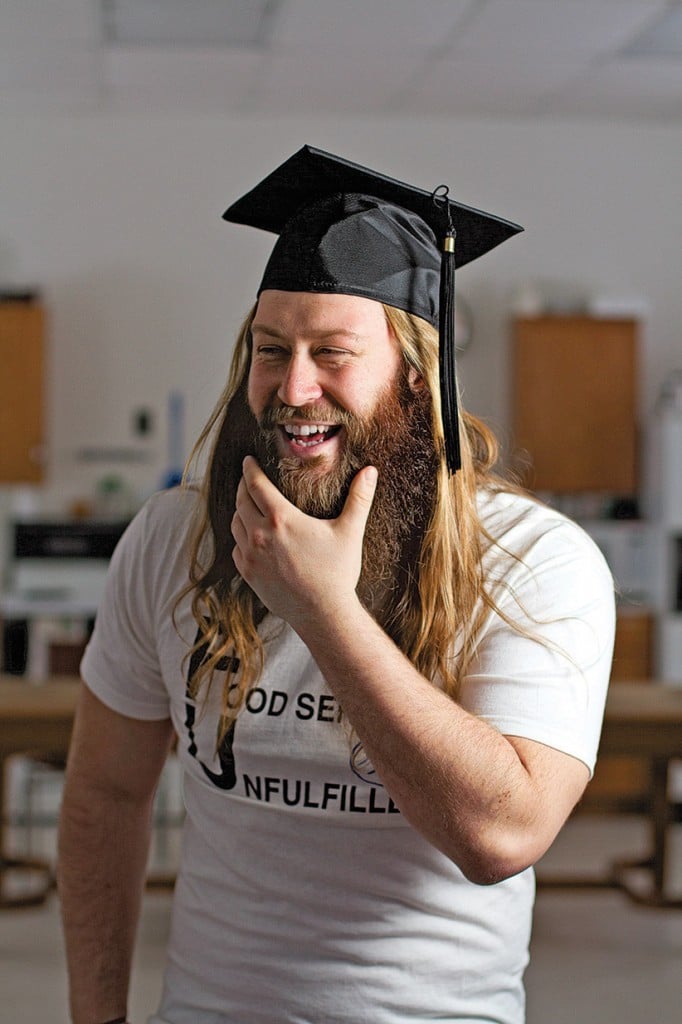 In his second year at the University of Manitoba, Matt Soprovich “spearheaded quite the ruckus.” To protest the cafeteria food and its exclusive provider, Aramark, he organized rallies, marches and even penned the 11-page “Aramark Manifesto,” which included a survey of students on food quality. And this was before Twitter and Facebook were prevalent on the Winnipeg campus. “To get the word out, I printed off a whole bunch of strips of paper, cut them up and slid them under everyone’s door in residence, saying: ‘Hey, we’re doing a rally tomorrow. Spread the word. It’s happening at this time,’ ” he remembers. “It’s much tougher than just creating a Facebook group.”
In his second year at the University of Manitoba, Matt Soprovich “spearheaded quite the ruckus.” To protest the cafeteria food and its exclusive provider, Aramark, he organized rallies, marches and even penned the 11-page “Aramark Manifesto,” which included a survey of students on food quality. And this was before Twitter and Facebook were prevalent on the Winnipeg campus. “To get the word out, I printed off a whole bunch of strips of paper, cut them up and slid them under everyone’s door in residence, saying: ‘Hey, we’re doing a rally tomorrow. Spread the word. It’s happening at this time,’ ” he remembers. “It’s much tougher than just creating a Facebook group.”
Though Aramark did renew its contract, Soprovich brought plenty of public attention to the issue. But when he graduated in 2009 with a degree in political science, he wanted nothing more to do with politics.
“I thought that, by the time I left [university], I would know what I wanted to do when I grew up,” he says. “Five years came around, and I was a little bit of a burnout.” Not to mention that the country was going through a recession, and good work wasn’t easy to find.
Soprovich took a few odd jobs—tree planting, youth care—before grabbing his motorcycle in the fall of 2010 to explore North America. When he wound up flat broke on the tiny island of Key West, Fla., he picked up a job as a pedicab driver dressed as a pirate. “This community of weirdos, eccentrics and people who didn’t fit in on the mainland welcomed me with open arms,” he says.
When he was ready to ride back to Canada, Soprovich got a call from a friend who convinced him to take a job fighting forest fires in Kenora, Ont. “It facilitated my ability to keep travelling in the off-season,” says Soprovich, now 29. “Come the wintertime, there are no forests on fire in Canada.”
While in Kenora, he volunteered on MPP Sarah Campbell’s 2014 re-election campaign. When Soprovich later threw his name in the hat to become her new constituency assistant in Fort Frances, Ont., she offered him the job, which he started in October. “My work shoes are no longer steel-toe boots; they’re Dockers,” Soprovich says. “And my uniform consists of a dress shirt and a collar, which is surprising for me.
“Almost as abruptly as I left [politics], here I was again.” (Photograph by Tom Thomson.)
Playlist: Hate, Myth, Muscle, Etiquette—Propagandhi
Facebook footnote: ‘I’m just so glad my mom didn’t have Facebook when I was growing up. I thank my lucky stars.’
Fashion file: ‘If there was a point where I was still able to wear the “food services unfulfilled” [T-shirt] in my day life—with a big F, and a big U—I would love to wear that in public.’
It’s your future. Make an investment up front with the 20th anniversary edition of the Maclean’s Canadian Universities Guidebook. Now available on newsstands and through macleans.ca/guide for $19.95. Subscribers get the digital edition for free on the Maclean’s app.
2008
Jesse Haber-Kucharsky
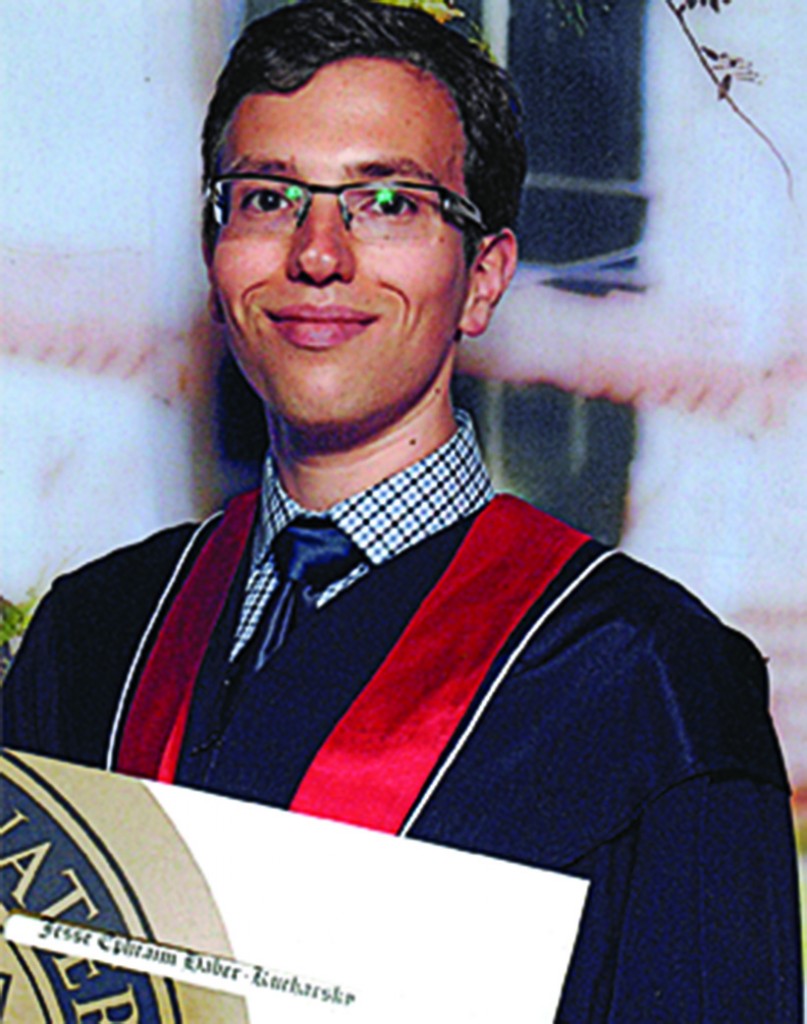 Jesse Haber-Kucharsky was a 17-year-old high school student wandering the campus of the University of Waterloo when he last chatted with Maclean’s. Back then, he wasn’t sure exactly what school he wanted to attend. For a degree in electrical engineering, he had several options in mind: Western University, Queen’s University and, in his hometown, the University of Toronto.
Jesse Haber-Kucharsky was a 17-year-old high school student wandering the campus of the University of Waterloo when he last chatted with Maclean’s. Back then, he wasn’t sure exactly what school he wanted to attend. For a degree in electrical engineering, he had several options in mind: Western University, Queen’s University and, in his hometown, the University of Toronto.
In the end, Waterloo won out. “The biggest draw was the co-op program,” he says. “And that was something I really took advantage of.”
During undergrad, Haber-Kucharsky found co-op placements as a systems engineer with IDT Canada, as an acoustic systems engineer with BlackBerry and as a software engineer for Arista Networks in Santa Clara, Calif. “Afterward, I had a much better idea of what I wanted and didn’t want to do.”
What he wanted to do was pursue graduate studies, focusing on the mathematical areas of electrical engineering. After being admitted to Carnegie Mellon University in Pittsburgh, he got more work experience as an intern with Microsoft Research in Redmond, Wash.
While a Ph.D. student at Carnegie Mellon, Haber-Kucharsky decided more school wasn’t for him. “I loved learning, but I just didn’t want to pursue a career as a researcher,” he says. Instead, he figured he could do research on his own time, or maybe within another aspect of his career. Now 24, he finished at Carnegie Mellon in December and moved back to Toronto for work.
About eight years after he first started checking out universities, Haber-Kucharsky was hired by PagerDuty, a software company. “It will be my first full-time software engineering job,” he says. There’s plenty to look forward to besides the steady pay, a job in his field and living close to home. The company has Hack Day competitions, ping pong matches and “whisky Wednesdays.” Most students would drink to that.
Playlist: The Bad Plus
Fashion file: ‘I have my engineering leather jacket from Waterloo, and I’ll probably never wear it’
2009
Jacqueline Dohaney
When Jacqueline Dohaney switched from physics to geology during her undergrad at Carleton University, she remembers one class where the geology professor went through a slide show of the places his work had taken him. There were photographs from Africa, New Zealand and even Antarctica. “We were like: ‘I’m sorry, is this a class?’ ” Dohaney remembers. “Geologists are really quite obsessed with travel.”
Fast forward and Dohaney, now 31, has done her fair share of travelling since graduating with a master’s degree in geological sciences from the University of British Columbia in 2009. During her master’s, she also worked as a sessional lecturer, which fuelled her passion for how people teach.
In 2010, she moved to New Zealand and began a 3½-year Ph.D. in geoscience education at the University of Canterbury, thanks to a full scholarship from a geothermal energy company. “We had carte blanche to research any new innovative way to understand how we should be teaching geology, specifically, geothermal energy and volcanology.”
Her first years in New Zealand, while interesting for her people in the field, were also scary. A 2010 earthquake in Canterbury had a magnitude of 7.1, while a second earthquake several months later with a magnitude of 6.3 killed 185 people. That real-life experience helped to make her current post-doc research in science communication at the University of Canterbury even more relevant.
“A big part of my research is what we call role-play simulation: training exercises to simulate what happens in a real disaster,” she says. Her students play out various scenarios, practising communication and improving decision-making.
But, like many geologists, she doesn’t like to stay put. Her work has taken her to Vancouver and, recently, to Indonesia for the Cities on Volcanoes conference. And when she’s not travelling for work, “I spend a lot of my money on travel.”
University playlist: ‘It’s all about Sam Roberts.’ Brother Down—Sam Roberts
Facebook footnote: ‘There were definitely a couple of nights at Oliver’s where the photo content would not have been good for Facebook’
Advice: In 2009, Dohaney told us, ‘Advanced-placement classes saved my life.’ Dohaney laughs off the life-saving quote today: ‘It saved me money more than anything.’
It’s your future. Make an investment up front with the 20th anniversary edition of the Maclean’s Canadian Universities Guidebook. Now available on newsstands and through macleans.ca/guide for $19.95. Subscribers get the digital edition for free on the Maclean’s app.
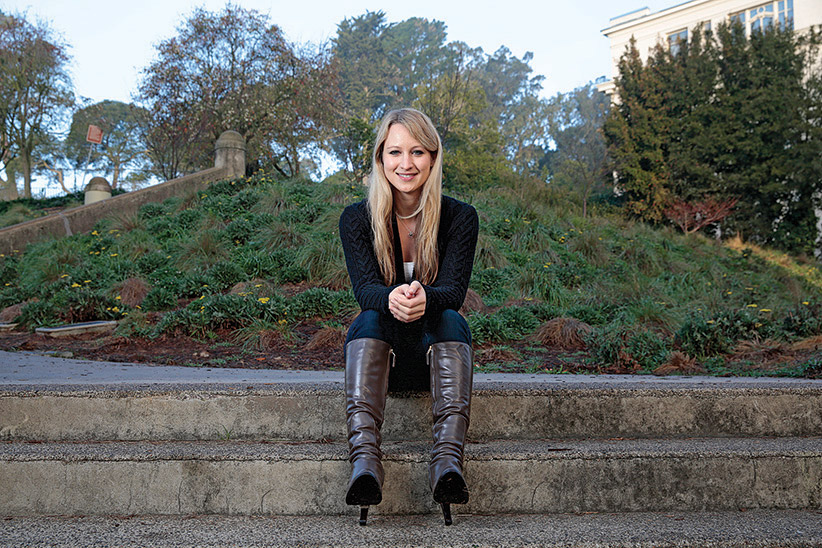
2010
Veronica Pinchin
If Veronica Pinchin wanted to graduate with her engineering classmates at McGill University, she needed to take four semesters with six classes. But Pinchin opted to add another semester and graduate in December 2009. As it turns out, that decision did wonders for her career, not to mention life experience.
It allowed time to prepare for job interviews, and Pinchin was hired after graduation by McKinsey and Co. as an analyst in their business technology office. Since she didn’t start until August 2010, “I had eight months to kill,” she says, “so I ended up spending four of those months volunteering in Ghana as a math teacher.”
After almost two years with McKinsey, Pinchin was accepted at Harvard Business School for its M.B.A. program. After first year, Pinchin joined Amazon as a senior product-manager intern, working on the Amazon Cloud Drive. When she returned to Harvard, her new focus was on technology and product management. After finishing her MBA in May 2014, Pinchin was hired by Google as a product manager, working on Google Knowledge. Now 27, she lives in San Francisco, and takes the Google Bus to work. It doesn’t sound as though that extra semester five years ago slowed her down at all.
Undergrad playlist: Every Me, Every You—Placebo
Fashion file: ‘We had these American Apparel hoodies, black with white piping, and a motorcycle neck that you zip up and it says “software engineering” on the back, which at the time I thought was so cool, but in hindsight was so dorky. But I still have it. I still kind of love it, but I will never wear it again.’
2011
Caitlin Wemigwans
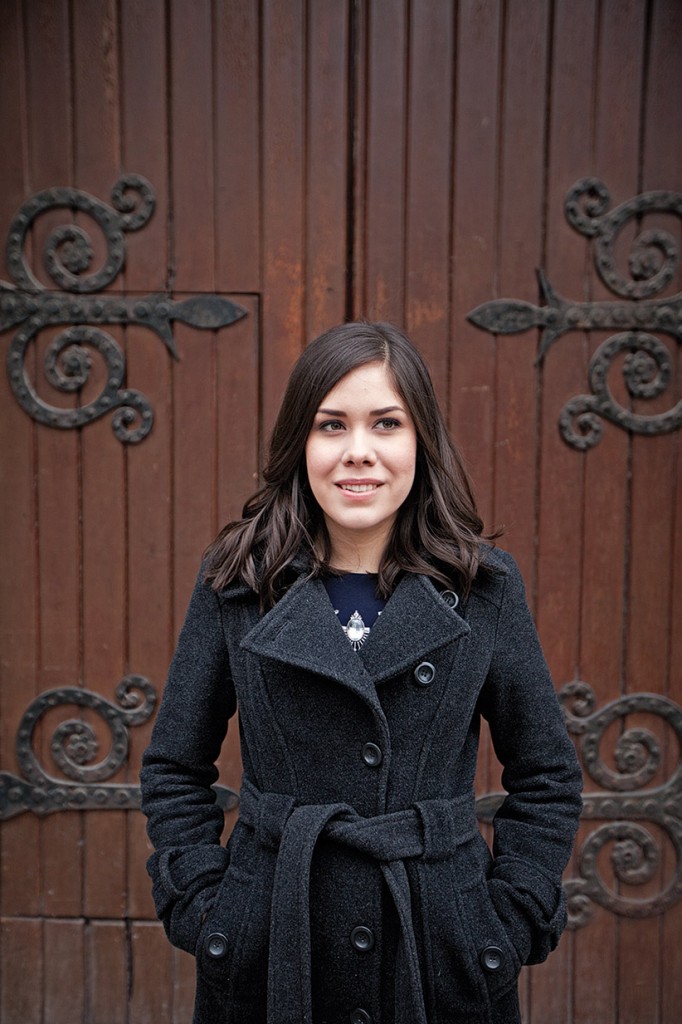 Caitlin Wemigwans was touring the University of Toronto campus when Maclean’s interviewed her as she debated whether a big school in a big city was the right fit, or if she would be better off at Nipissing University in her hometown of North Bay, Ont.
Caitlin Wemigwans was touring the University of Toronto campus when Maclean’s interviewed her as she debated whether a big school in a big city was the right fit, or if she would be better off at Nipissing University in her hometown of North Bay, Ont.
She was accepted into both, but opted for Toronto. Wemigwans originally focused on Aboriginal studies, but eventually shifted to a major in art history. Although she found history classes a bit dry, bringing art into the mix changed everything.
“Everything I’ve done has had something to do with art or history, so I combined them both and it worked out well,” says the 24-year-old. That includes spending a summer in Italy in 2012. “Walking the street in the city itself is a museum,” she adds. “In every city.”
Now in her fourth year at U of T, a reduced course load means the 24-year-old is a year away from graduating, and she’s not looking to leave Toronto, especially as she and her boyfriend own a condo together—and a cat. But what about her future?
Before she started at U of T, she had no idea what she wanted to do, and she admits she still has no clue. She’s thinking about academia and maybe becoming a professor. Another option is go to college and get practical skills for a career she’ll love. Maybe fashion. “I’m just trying to weed out what I don’t like,” she says.
Advice to students: ‘Stay with your parents if you can—not as long as you can, [but] as long as it benefits you’
It’s your future. Make an investment up front with the 20th anniversary edition of the Maclean’s Canadian Universities Guidebook. Now available on newsstands and through macleans.ca/guide for $19.95. Subscribers get the digital edition for free on the Maclean’s app.
2012
Nadia Nowak
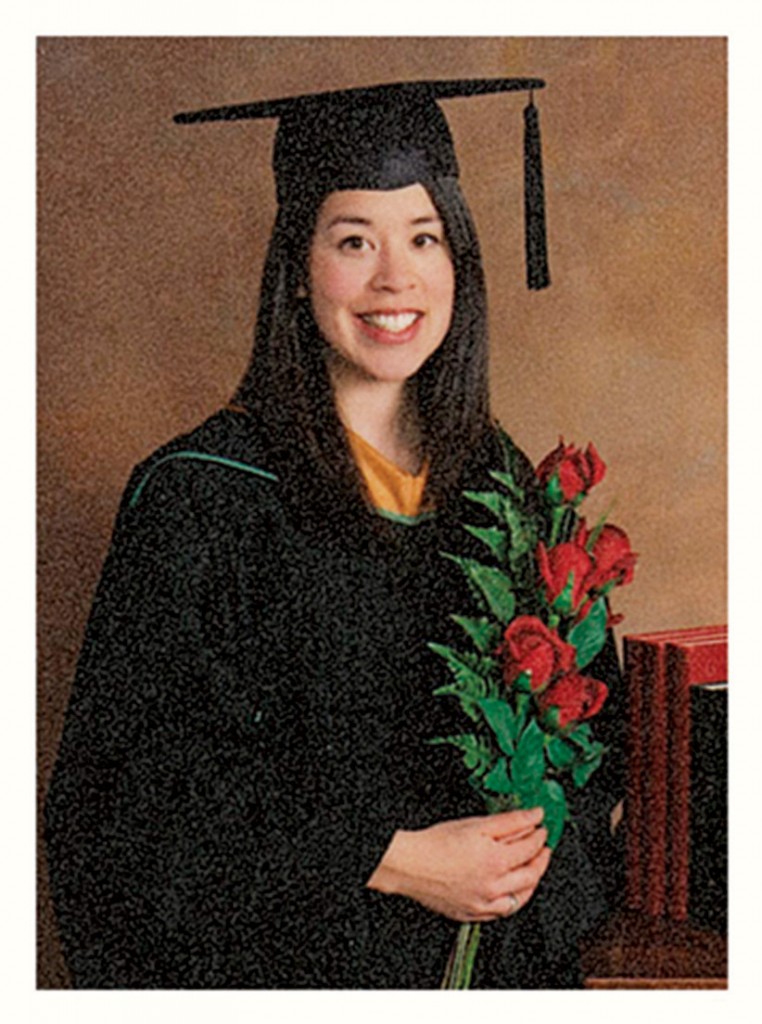 Nadia Nowak isn’t keen on living in the big city. That’s partly why she chose the University of University of Northern British Columbia (UNBC) in Prince George, B.C.
Nadia Nowak isn’t keen on living in the big city. That’s partly why she chose the University of University of Northern British Columbia (UNBC) in Prince George, B.C.
When Maclean’s talked to Nowak, she was finishing her degree in environmental planning. After graduating in 2012, she quickly found an economic development internship with the Northern Development Initiative Trust, a non-profit that provides funding to northern communities to stimulate economic development. Within months, she received a job offer as community outreach coordinator for bioregional research with the Northwest Institute, a non-profit advocacy group that focuses on sustainable development. So Nowak packed her bags and moved to Smithers, B.C., about 350 km northwest of Prince George.
“I think this is a really pivotal region in terms of the economy and stability of the province,” she says. “With this job, I feel I can play an important role in making sure we have a good future here.” Nowak has since been quoted in news outlets from CBC to Yahoo! opposing the Northern Gateway pipeline.
While Smithers was her home until recently, Nowak moved back to Prince George to work remotely and live with her boyfriend. Now 27, she’s considering more education, maybe at UNBC or Simon Fraser. There’s still more to learn. She remembers being at a climate-change conference where the keynote speaker said: “We can’t just change the light bulbs. We need to change the laws.” That’s how Nowak thinks today—about the big picture.
Advice: ‘The time you spend in the classroom is just as important as the activities you engage in outside the classroom’
Study playlist: The Suburbs—Arcade Fire
2013
Katie Dutchak
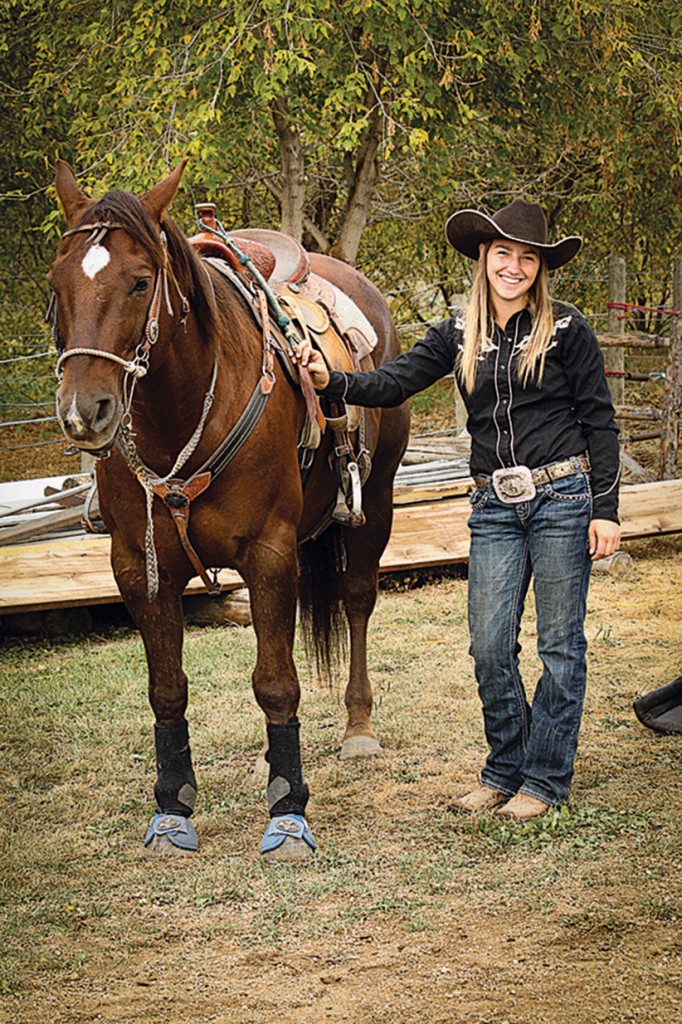 Katie Dutchak loves the rodeo. She loves it so much that she helped to bring a rodeo club back to the University of Saskatchewan after a 30-year absence. That was in her first year, when she was an arts and science major and shared her cowgirl roots with Maclean’s. What she didn’t know then was the impact the club would have on the program she wanted to pursue.
Katie Dutchak loves the rodeo. She loves it so much that she helped to bring a rodeo club back to the University of Saskatchewan after a 30-year absence. That was in her first year, when she was an arts and science major and shared her cowgirl roots with Maclean’s. What she didn’t know then was the impact the club would have on the program she wanted to pursue.
Going to university, she thought she wanted to study kinesiology and the human body—she did competitive wrestling, after all—but after a few classes, she realized that while it was interesting, it was not something in which she could see a career.
Now in her fourth year of school, Dutchak has switched into the business management program at U of S. “I think the rodeo team had a lot to do with it,” says the 22-year-old, who worked on the promotion and financing aspects of the club. “The great thing about business is that it’s very hands-on.” Kind of like riding a horse.
Study playlist: Anything classical. ‘No words.’
Fashion file: Dutchak’s lucky shirt was ruined during a rodeo. ‘I was in one of my events—goat tying—and it got ripped up when I had a pretty good spill off the horse during my dismount.’
2014
Kristy Normore
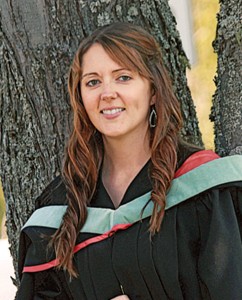 Kristy Normore is about as far from her university campus as it gets. She was thinking about enrolling at the University of Victoria last time we spoke to her, and that’s exactly what she’s doing.
Kristy Normore is about as far from her university campus as it gets. She was thinking about enrolling at the University of Victoria last time we spoke to her, and that’s exactly what she’s doing.
Growing up in L’Anse-au-Loup, N.L.—population 600—Normore wanted to do social work ever since she was a kid. “That was my mantra: ‘I want to help people.’ ” She earned a diploma from Nova Scotia Community College in Sydney, and graduated from the bachelor of arts community studies program at Cape Breton University in 2012, the same year she gave birth to her daughter, Chloe.
After starting distance studies at UVic last fall in social work with an indigenous specialization, Normore is doing a paid-work practicum in Goose Bay with NunatuKavut, an organization that promotes the traditions, cultures and well-being of the southern Inuit of Labrador. Normore will take the summer off, as she is expecting her second child in April. She looks forward to starting school again in the fall, as well as another work practicum.
Pre-study ritual: Before Normore can sit down and study for a test, she has to read something completely unrelated to the topic, from The Da Vinci Code to Twilight, or even a cookbook
It’s your future. Make an investment up front with the 20th anniversary edition of the Maclean’s Canadian Universities Guidebook. Now available on newsstands and through macleans.ca/guide for $19.95. Subscribers get the digital edition for free on the Maclean’s app.
2015
Jordan Sherbino
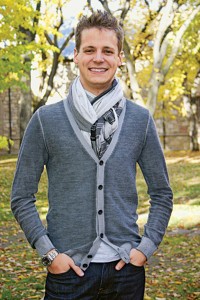 Jordan Sherbino is loving Victoria. It’s mid-January and 9° C, way warmer than Saskatchewan. But the climate wasn’t his only reason for leaving the Prairies. “I had lived the first 23 years of my life in pretty much the same space, and I was wanting a little bit of a change.”
Jordan Sherbino is loving Victoria. It’s mid-January and 9° C, way warmer than Saskatchewan. But the climate wasn’t his only reason for leaving the Prairies. “I had lived the first 23 years of my life in pretty much the same space, and I was wanting a little bit of a change.”
Ever since finishing his undergrad at the University of Saskatchewan in 2013 and becoming vice-president of academic affairs for the student union, Sherbino had been thinking about doing his master’s degree, which he started last September in political science at the University of Victoria. Sherbino is still passionate about student issues, and recently got involved with a committee for students with disabilities. “I promised myself I wouldn’t get involved,” the 24-year-old says, “but I’m not good at keeping promises.”
Study playlist: The Shins—Port of Morrow. ‘That always reminds me of studying in the library in undergrad. It takes me back to third year, trying to cram and write essays.’
